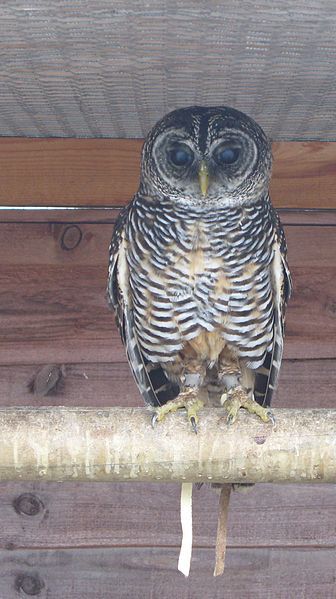Rufous-legged Owl
http://www.owls.org/Species/strix/rufous_legged_owl.htm

Original source: Julian TysoePermission(Reusing this file)This image, which was originally posted to Flickr.com, was uploaded to Commons using Flickr upload bot on 23:32, 31 May 2011 (UTC) by Pauk (talk). On that date it was licensed under the license below.This file is licensed under the Creative Commons Attribution 2.0 Generic license.You are free:to share – to copy, distribute and transmit the work
Author: Julian TysoePermission(Reusing this file)This image, which was originally posted to Flickr.com, was uploaded to Commons using Flickr upload bot on 23:32, 31 May 2011 (UTC) by Pauk (talk). On that date it was licensed under the license below.This file is licensed under the Creative Commons Attribution 2.0 Generic license.You are free:to share – to copy, distribute and transmit the work
The Rufous-legged Owl is classified as Least Concern. Does not qualify for a more at risk category. Widespread and abundant taxa are included in this category.
The Rufous-legged Owl (Strix rufipes King) is a forest specialist that inhabits the woodlands of southern South America. Dietary studies have shown it to be a generalist predator (D.R. Martinez 1993,/. Raptor Res. 27:214-216). Recent research on habitat use indicates it is associated with old-growth forests (D.R. Martinez and F.M. Jaksic 1996, Ecosaence 3:259263), and cavity-bearing dead trees have been suggested as the key features and limiting factors in suitable habitat (R. Rozzi et al. 1996, pages 135-152 mJJ. More
Food Habits of the Rufous-Legged Owl (Strix rufipes) in the Mediterranean Sclerophyllous Forest of Central Chile IV�N D�AZ Journal of Raptor Research: 33(3): September 1999: 260-264. The Rufous-legged Owl (Strix rufipes) inhabits old- growth temperate rainforest of southern South America (Housse 1945, Goodall et al. 1946, Johnson 1967, Vuil- leumier 1985, Martinez and Jaksic 1996, 1997). More
The Rufous-legged Owl (Strix rufipes) is a medium sized owl with no ear tufts. Its upper parts are rufous brown barred with white with more white on the head and nape. It has a rufous facial disk and dark eyes, and its legs and feet are orange-brown to cinnamon. It grows to a size about 33-38 cm long and weighs about 300-400 grams. Its range stretches from central Chile and west Argentina to Tierra del Fuego and is occasionally spotted on the Falkland Islands. More
abundance of rufous-legged owls (Strix rufipes King) in six secondary and five old-growth rainforest remnants of southern Chile. Over 62 nights spanning four years, we surveyed 37 linear km of secondary- and 49 km of old-growth forests, detecting the presence of 0.127 and 0.220 owl pairs/km, respectively. Canopy cover accounted for 68% of the variance in owl abundance, based on a stepwise regression. Mean diameter at breast height (d.b.h. More
By night, rufous-legged owls hunt for birds, reptiles, insects, and small, tree-dwelling mammals. By day, they roost on the branches of lichen-covered trees, in dense foliage, or in natural tree cavities in moist, moss-covered forests on mountain slopes and lowlands. A medium-sized, round-headed owl with dark-brown eyes and no ear tufts, this species boasts a layer of orange-brown to cinnamon-buff feathers on both its legs and its toes. More
Here are details of the rufous-legged owls we have at the sanctuary: Rufous-legged owls Name Sex Hatched Status Perkins Female 1999 Hand tame owl Misty Female 1996 Breeding owl Kenwyn Male 1996 Breeding owl Peru More
